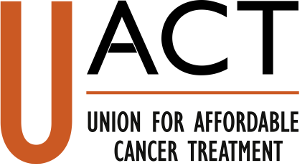What is UACT?
The Union for Affordable Cancer Treatment (UACT) is an international network of people who share the conviction that cancer treatment and care should be available everywhere for everyone regardless of gender, age, nationality, or financial resources.
Who are we?
We are a union of people – people affected by cancer, their family members and friends, people who take care of people with cancer, health care professionals and cancer researchers — all committed to increasing access to effective cancer treatment and care.
We are particularly concerned about the rapidly escalating cost of cancer medication and we believe that cancer medicines and other essential medical tools such as diagnostic tools should be affordable.
UACT is a membership organization consisting of a body of members who feel passionate about our mission and focus, a steering committee which plans, guides, and assists in the execution of UACT’s actions against high cancer prices, and a board of directors to provide expert input and organization direction. Please visit our Board of Directors page for biographical information regarding our leadership.
What do we want?
– We fight for cancer treatment and care to be affordable and available, everywhere, for everyone who needs it.
– We believe that the global concept of “access to medicines for all” includes cancer medicines.
– We believe that legal trade frameworks must be designed to improve access to medicines and not hamper it.
– We advocate reforms that result in new and improved cancer treatments through more efficient systems for financing research and development, in particular through de-linking the cost of R&D from the price of the product.
– We demand greater transparency on the part of pharmaceutical companies and government drug approval agencies regarding the relative costs of research and development (R&D) and the prices charged for drugs; revenues from sales of cancer medications should be publicly available.
It is a principle of the UACT to not accept money from pharmaceutical companies or any other commercial company that does not endorse the objectives of the UACT.
